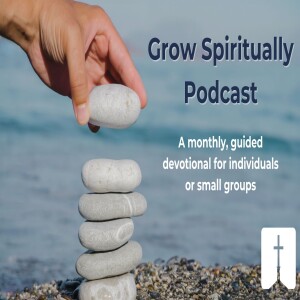Episodes

Sunday Feb 09, 2025
05 - Forgive | The Sermon that Changed the World
Sunday Feb 09, 2025
Sunday Feb 09, 2025
Pastor Amy - 2.9.25
Small Group Guide: Forgiveness
Opening Prayer
Bible: Matthew 6:7-15
Key Takeaways:
- Forgiveness is a central theme in the Lord's Prayer and Jesus' teachings.
- Forgiving others and receiving God's forgiveness are interconnected.
- Forgiveness is about releasing debts and removing barriers in relationships.
- Forgiveness doesn't mean ignoring wrongdoing but creates space for healing and growth.
- Our capacity to forgive is linked to our ability to love and experience God's love.
Discussion Questions:
- What stood out to you most from the sermon? Why?
- How does understanding forgiveness as "debt cancellation" change your perspective on forgiving others?
- Discuss the statement: "We can't truly live into our freedom while we are holding onto the chains around somebody else's ankles." What does this mean to you?
- Pastor Amy distinguishes between forgiving and enabling harmful behavior. How can we forgive while still maintaining healthy boundaries?
- In what ways does holding onto unforgiveness act as a barrier in our relationships with others and with God?
- How might viewing forgiveness as 'tearing down walls' rather than 'forgetting wrongs' change our approach to reconciliation?
- How can we cultivate a spirit of forgiveness that, like God's forgiveness, invites reflection and repentance without making it a prerequisite?
Practical Applications:
- This week, identify one person you need to forgive. Spend time in prayer, asking God to help you release any "debt" you feel they owe you.
- Reflect on areas where you might need forgiveness. Take steps to apologize or make amends where necessary.
- When we pray "Your kingdom come, Your will be done," we're inviting God's reign into our everyday lives. This means embodying love, justice, and peace in our interactions and decisions. Today, pause and consider: How can you bring a piece of God's kingdom to your workplace, home, or community? It might be through an act of kindness, speaking up against injustice, or fostering peace in a conflict. Remember, building God's kingdom starts with small, faithful actions in our daily lives.
Closing Prayer:
God of grace, you forgive us without a second thought, and love us long before we have a chance to repent. Give us the strength, compassion, and courage to extend this grace and forgiveness to others, not because it erases the past, but because it is the only way into a peaceful future. In Jesus’ name we pray, Amen.
https://churchlinkfeeds.blob.core.windows.net/notes/46163/note-226086.html

Monday Feb 03, 2025
04 - Love Enemies | The Sermon that Changed the World
Monday Feb 03, 2025
Monday Feb 03, 2025
Pastor Josh Sermon February 2, 2025 - Matthew 5:38-48
Small Group Guide: Loving Your Enemies
Opening Prayer
Key Quotes:
- Any version of Christianity that proclaims that it has enemies to attack and defeat doesn't seem like much of a Christianity.
- Any gospel that promises blessing without challenge, moralism without justice, or righteousness without repentance is something other than the gospel of Jesus.
- The strength to love our enemies is not a feeling, but a deep spiritual resolve. The strength to love enemies requires a dramatic reframing of how we see the other.
- When we choose to love even our enemies, our hearts are moved from anger to compassion. We are freed from the bondage to bitterness and despair and hatred.
Key Takeaways:
- Jesus' command to "love your enemies" is a radical and transformative teaching.
- True Christianity cannot coexist with the concept of having enemies.
- Loving enemies is not about being nice or ignoring harm, but about seeking transformation.
- We must reject the culture of "enemying" and instead seek reconciliation and understanding.
- Loving our enemies protects our own hearts from bitterness and hatred.
Discussion Questions:
- What was your initial reaction to Jesus' command to "love your enemies"? How does it challenge you personally?
- Pastor Josh asks, "Can a Christian truly have enemies?" How would you answer this question? How does it make you reconsider your own relationships or attitudes?
- Discuss the difference between loving enemies and excusing harmful behavior. How can we balance love with accountability?
- The sermon mentions several "faux gospels" (Prosperity gospel, Americanity, Therapeutic Moralistic Deism). Have you encountered these? How do they differ from Jesus' teachings?
- Reflect on Dr. King's principle: "Nonviolence seeks to win understanding and friendship." How might this approach change conflicts in your life or in society?
- Pastor Josh suggests reframing "enemy" as a problem rather than a person. How does this shift in perspective impact your approach to difficult relationships or situations?
- Discuss the concept of "compassionate curiosity." How might asking questions about someone's background or experiences help us love those we find difficult?
- How does choosing to love our enemies protect and free our own hearts? Share any personal experiences of this.
Practical Applications:
- This week, identify one person or group you struggle to love. Commit to praying for them daily, asking God to help you see them as He does.
- Practice "compassionate curiosity" by asking thoughtful questions to understand someone you disagree with, rather than arguing or avoiding them.
- Reflect on any "enemying" behaviors in your own life. Choose one to consciously replace with an attitude of reconciliation or understanding.
Closing Prayer:
Heavenly Father, your love knows no bounds. Give us the strength and courage to love as you love, even when it's difficult. Transform our hearts, heal our relationships, and use us to bring your reconciling love to a world in need of it. In Jesus' name, Amen.

Sunday Jan 26, 2025
03 - Reconcile | The Sermon that Changed the World
Sunday Jan 26, 2025
Sunday Jan 26, 2025
Pastor Josh - January 26, 2025
Small Group Guide: Reconciliation and Letting Go of Anger
Key Takeaways:
1. Jesus emphasizes reconciliation and letting go of anger as foundational to following Him.
2. Harboring anger affects both our relationships with others and with God.
3. We live in an "outrage culture" that often fuels anger and division.
4. Reconciliation is possible, even in seemingly impossible situations, because Jesus walks with us.
Discussion Questions:
1. Why do you think Jesus starts His teachings in the Sermon on the Mount with a focus on anger and reconciliation?
2. Pastor Josh said forgiveness is "one of the hardest things God will ever ask us to do" but also "one of the most powerful, beautiful, and freeing things." Share an experience where you've found this to be true in your own life.
3. How does holding onto anger affect your relationship with God? Have you experienced this personally?
4. Discuss the concept of "outrage culture." How have you seen this manifest in your own life or in society?
5. How can we apply Jesus' teachings on reconciliation in our digital age, especially on social media?
Practical Applications:
1. This week, take time to pray about any anger you might be holding onto. Ask God to help you identify it and begin the process of letting it go.
2. Identify one relationship or situation in your life where you can be a reconciler or peacemaker. What specific steps can you take?
3. Practice extending compassion to someone who holds different views from you, following Nancy's example.
Prayerful Questions
1. "God, what anger might you be inviting me to let go of this week?"
2. "Jesus, where are you calling me, leading me to be a reconciler and a peacemaker this week?"

Monday Jan 20, 2025
02 - Salt | The Sermon that Changed the World
Monday Jan 20, 2025
Monday Jan 20, 2025
Pastor Varinia - Matthew 5:13-16
Small Group Guide: Being Salt
Opening Question:
- What's your relationship with salt in your daily life? Do you use it often, avoid it, or have any interesting experiences with it?
Key Takeaways:
1. Jesus describes our identity as "salt of the earth" - it's who we are, not just what we have.
2. Being salt means influencing the world around us in a positive, gracious way.
3. We can lose our "saltiness" if we don't live differently from the world.
4. Our words and actions should reflect our identity in Christ.
Discussion Questions:
1. What does it mean to you personally to be the "salt of the earth"?
2. How can we be "salty" in our everyday interactions without being overbearing?
3. The sermon mentions being gracious in our speech. Can you share an example of when you've seen this done well?
4. What are some areas in your life where you feel you might be losing your "saltiness"?
5. How can we balance being "in the world" while maintaining our distinct Christian identity?
Bible Verse for Reflection:
Read Colossians 4:6 together: "Let your conversation be always full of grace, seasoned with salt, so that you may know how to answer everyone."
- What does this verse add to our understanding of being "salt"?
Practical Applications:
1. Social Media Challenge: Before posting anything this week, ask yourself, "Is this seasoned with salt? Does it reflect my identity in Christ?"
2. Gracious Speech Exercise: Practice responding to a disagreement or criticism with graciousness this week. Share your experience at the next meeting.
3. Salt in Action: Identify one area in your community or workplace where you can be a positive influence this week. Take action and report back.
4. Reflection Journal: Each day this week, write down one way you were "salt" in your interactions with others.

Thursday Jan 16, 2025
24 - Rhythms and Rituals | Grow Spiritually Devotional
Thursday Jan 16, 2025
Thursday Jan 16, 2025
January 2025 - "Grow Spiritually" is a monthly guided devotional, offered for use with your family or on your own. January's theme is Rhythms and Rituals.

Wednesday Jan 15, 2025
January 5, 2025- Matthew 2:19-23- Pastor Josh
Wednesday Jan 15, 2025
Wednesday Jan 15, 2025
Small Group Guide
The Epiphany Story - Contrasts, Feelings, and "What Ifs"
Opening Question:
Share a time when you felt like you were going "out of the frying pan and into the fire." How did you handle that situation?
Key Takeaways:
1. The Epiphany story is about contrasts between the generous Magi and the tyrannical King Herod.
2. It highlights intense emotions: fear, joy, and anxiety.
3. The story presents "what if" moments that challenge us to consider how our choices impact God's plan.
Discussion Questions:
1. How do you think Mary and Joseph felt during their journey from Bethlehem to Egypt? How might their experience relate to modern-day refugees or asylum seekers?
2. The sermon mentions that the Magi were "overwhelmed with joy" when they saw Jesus. When was the last time you felt overwhelmed with joy in your faith journey?
3. Discuss the contrast between Herod's reaction and the Magi's reaction to Jesus' birth. What does this tell us about different responses to God's work in the world?
4. The sermon asks, "When we come face to face with Jesus, what do we feel?" How would you answer this question?
5. What "what if" moments have you experienced in your life where you felt God calling you to step out in faith?
6. How can we be more like Egypt in the story, welcoming and providing safety to those in need?
Practical Applications:
1. This week, be intentional about noticing the "small what-if moments" in your daily life. Keep a journal of these moments and how you responded.
2. Reflect on Matthew 25:35 ("I was a stranger and you welcomed me"). Brainstorm ways your group could welcome strangers or help those seeking refuge in your community.
3. Practice saying "yes" to God this week. When you feel prompted to help someone or step out in faith, do it and see what happens.
4. Consider researching local organizations that work with refugees or asylum seekers, like The International Institute, or Welcome Neighbor STL. How might your group support their efforts?
Closing Prayer:
Lord, like the Magi, help us to seek You with joy and enthusiasm. Give us courage to say "yes" to Your promptings, even when it feels risky. Open our eyes to the "what if" moments in our lives, and help us to be welcoming to strangers. May we be instruments of Your love and peace in this world. Amen.

Wednesday Jan 15, 2025
01 - Follow | The Sermon that Changed the World
Wednesday Jan 15, 2025
Wednesday Jan 15, 2025
Pastor Amy - Matthew 4:12-22
Small Group Guide: Following Jesus
Opening Prayer:
Begin your session with a prayer, asking God for guidance and open hearts as you discuss the sermon's message.
Key Takeaways:
1. Jesus began his ministry in response to the state of the world, calling followers to join him in creating something better.
2. Following Jesus is more about actions than words or beliefs.
3. Repentance means turning away from old ways and towards Jesus' teachings.
4. Unity comes from following Jesus together, even if our individual callings differ.
5. God's grace is always available, allowing us to try again when we fall short.
Discussion Questions:
1. What stood out to you most from the sermon? Why?
2. The sermon mentions that the first disciples followed Jesus immediately, knowing very little about him. What do you think motivated them? How does this compare to our own reasons for following Jesus today?
3. How do you understand the concept of "repentance" as described in the sermon? What might you need to "turn away from" to follow Jesus more closely?
4. The pastor states that Jesus was more interested in how people lived than what they believed. Do you agree? How does this challenge or affirm your understanding of faith?
5. Discuss the difference between following Jesus through actions versus words. How do you see this playing out in your own life and in the broader Christian community?
6. The sermon mentions several actions that characterize following Jesus (serving, healing, welcoming, etc.). Which of these do you find most challenging? Most natural?
7. How can we work towards creating a "beloved community" as described in the sermon? What obstacles might we face?
Practical Applications:
1. This week, identify one aspect of your life where you need to "turn around" or repent. Share with the group next time how you worked on this.
2. Choose one action mentioned in the sermon (e.g., welcoming, listening, reconciling) and intentionally practice it this week, especially with someone you find challenging.
3. Reflect on how you can "fish for people" in your daily life. What does this look like in a non-aggressive, loving way?
4. As a group, brainstorm ways you can embody the principles of non-violence and love in your local community.
5. Commit to reading through the Sermon on the Mount (Matthew 5-7) over the next week, noting any parts that particularly challenge or inspire you.

Monday Dec 23, 2024
04 - Love | Advent 2024
Monday Dec 23, 2024
Monday Dec 23, 2024
Mary and Elizabeth celebrate what God is doing in their lives and in the world.
Pastor Amy, December 22, 2024

Thursday Dec 19, 2024
23 - Blue Christmas | Grow Spiritually Devotional
Thursday Dec 19, 2024
Thursday Dec 19, 2024
"Grow Spiritually" is a monthly guided devotional, offered for use with your family or on your own. December's theme is Blue Christmas.

Sunday Dec 15, 2024
02 - John | Advent 2024
Sunday Dec 15, 2024
Sunday Dec 15, 2024
Pastor Josh shares a message about waiting and John the Baptist bringing people together in difficult times. Luke 3.

